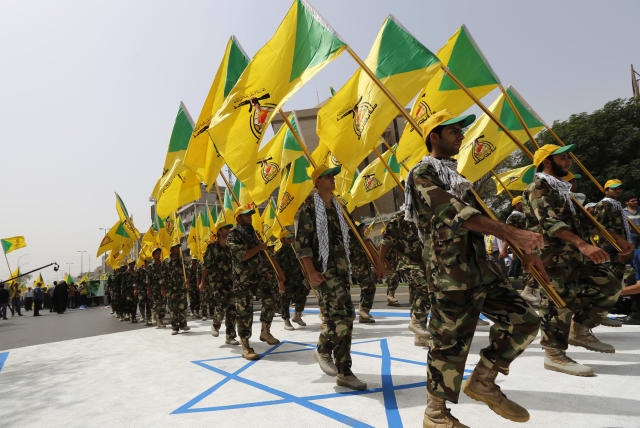Iranian-backed militias in Iraq may stop attacking Israel - analysis

A report this week indicates that some of these militias and groups have stepped back from attacks in the wake of the Israel-Lebanon ceasefire.
Iranian-backed militias in Iraq have been attacking Israel for a year, since October 7, 2023, initiating attacks almost immediately after the Hamas attack, first targeting US forces in Syria and Iraq and then expanding the attacks to strike at Israel.
These groups call themselves the Islamic Resistance in Iraq but are actually made up of several militias and groups, and usually use drones to target Israel due to the geographic distance.
A report this week indicates that some of these groups have scaled back the attacks following the Israel-Lebanon ceasefire signed on November 27, which ended Hezbollah’s attacks on Israel. An Al-Akhbar report on Monday – from an outlet generally seen as pro-Hezbollah – indicated that some of the Iraqi groups agreed to cease attacks.
Harakat Hezbollah al-Nujaba, a radical Shi’ite group based mostly in Iraq, though formerly in Ba’athist Syria, said that it agreed with Iraqi Prime Minister Shia al-Sudani to stop its offensive operations against Israel.
The spokesman for one of the groups, the Sayyed al-Shuhada Brigades, addressed this as well: Kazem al-Fartousi was quoted in the same report as saying that “circumstances determine the positions of the factions, and the principle of unity of arenas is not linked to a temporary alliance between the factions of the axis of resistance, but rather it is a matter of principle and doctrine, and whatever the losses, the Iraqi factions have not and will not abandon the principle of unity of arenas.”
This statement includes a number of terms and keywords that clue the readership into what the Iranian-backed militias are thinking.
“Axis of resistance” refers to Iran itself and pro-Iran groups such as Hezbollah, Palestinian Islamic Jihad, the Houthis, and militias in Iraq. When he mentioned the “unity of the arenas,” this is the term for Iran coordinating with all these groups to attack Israel. This was put into place several years ago, and after October 7 Iran operationalized this multi-front war on Israel.
Al-Fartousi is saying that new circumstances could mean a temporary end to attacks, yet the group still won’t stop. He said that “operations against Israel were linked to the operations of… Hezbollah, and when the ceasefire was reached in Lebanon, the operations of the Iraqi factions stopped… There are also partners in Iraq who have an opinion and reservations about those operations, and they must be listened to.” Now, the groups are “studying” what to do next, he said.
Nujaba, one of the key pro-Iran groups in Iraq, said that it agreed to stop operations for now. However, this statement may not mean much, as it is not clear that Nujaba is the main group behind the drone attacks.
Nevertheless, the pro-Iran militias and the Iraqi government are more concerned – at the moment – with Syria, with increasing calls for the militias to be disbanded in Iraq and hand over their arms to the government.
Baghdad doesn’t want to provoke a rebellion and trigger something similar to what happened in Syria. The Sunnis in Iraq resent the role of the Shi’ite pro-Iran militias and may see the fall of Assad as an opportunity.
“Iran gave us the freedom to decide regarding the Syrian scene and the control of the terrorist groups called Hay’at Tahrir al-Sham,” the Nujaba source told Al-Akhbar and added that the US and Israel want the various militias in Iraq disbanded, worried about how Syria could impact progress on this.
The Iraqi-based militias come under the umbrella of the Popular Mobilization Units or Forces in Iraq (PMU). This group was created in 2014 to fight ISIS and includes dozens of brigades. The group had up to 100,000 men under arms during the ISIS war, including the Badr militias, as well as Kataib Hezbollah, Nujaba, Asaib Ahl al-Haq, and many other groups.
After 2018, the PMU became an official paramilitary force with a state budget. Many of the groups are linked to the Interior Ministry in Iraq. However, they also became involved in attacks on US forces in Iraq and Syria. In January 2020, the US killed IRGC Quds Force head Qasem Soleimani in Baghdad along with Abu Mahdi al-Muhandis, the head of Kataib Hezbollah, effectively putting the militias on notice.
They didn’t stop though, and this past January, Kataib Hezbollah killed three Americans in Jordan in a drone attack. Now, it appears these groups have toned down their threats and attacks, at least temporarily.
Jerusalem Post Store
`; document.getElementById("linkPremium").innerHTML = cont; var divWithLink = document.getElementById("premium-link"); if (divWithLink !== null && divWithLink !== 'undefined') { divWithLink.style.border = "solid 1px #cb0f3e"; divWithLink.style.textAlign = "center"; divWithLink.style.marginBottom = "15px"; divWithLink.style.marginTop = "15px"; divWithLink.style.width = "100%"; divWithLink.style.backgroundColor = "#122952"; divWithLink.style.color = "#ffffff"; divWithLink.style.lineHeight = "1.5"; } } (function (v, i) { });

